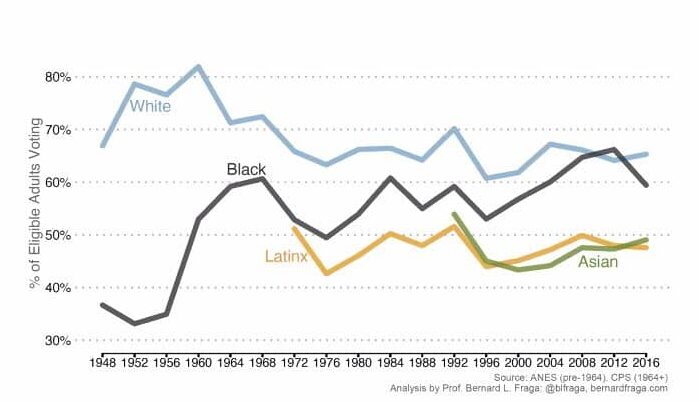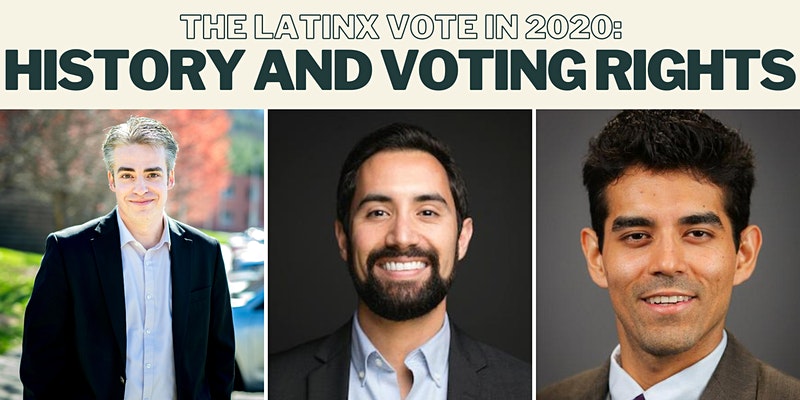Voting rights, as you might imagine in an election year, is a key point of study and consideration. In a year where there is reportedly a 14% drop in the Latino vote for the Democratic candidate from the 2016 election, it’s imperative that we study the history of Latino communities as it relates to voting to understand how the current climate came about.
Last week, the Center for Latino Research collaborated with other DePaul University departments to remotely host the Latinx Vote in 2020: History & Voting Rights event, the second panel of this topic. The stars of the show, historian Benjamin Francis-Fallon and political scientist Bernard Fraga, conversed with Joe Tafoya, a DePaul professor of political science, showcasing their research and books on the subject of Latino voting rights both historically and today.
Dr. Francis-Fallon, a teacher at Western Carolina University, presented the contents of his book Rise of the Latin Vote: A History, detailing the complexities of the diverse national identity of the Latino population and the struggle by politicians to consolidate and win over the Latino vote, or as Republicans viewed it, the “Spanish Speaking Concept.”
He told a brief summative narrative, beginning with the election efforts of JFK and Latino political activists to organize behind the soon-to-be president and how JFK dismantled their efforts after victory. This established a trend in the Democratic party of failing to appeal to Latinos, a trend that continues to this day. Republicans, however, have achieved success in the persuasive endeavor, their rhetoric of associating the working Latino family with the American Dream tapping into a conservative base.
More impactful was the ethnic diversity of Latinos, divided between Mexican, Puerto Rican, Cuban, Venezuelan, and many other heritages. The history and representation of these groups is tumultuous and has often been charged with “brown against brown” political strategies – one significant instance included the formation of Republican National Hispanic Assembly.
Founded by conservative Ben Fernandez under the Nixon administration, the group promoted a sort of “ethnic individualism” amongst Latino populations, but a criticism originating from Cuban Americans was that it was a “Mexican clique.” As Cuban immigration increased in the 70s and 80s, many Cubans found work influencing immigration policy inside the Reagan administration, enforcing stronger rules along the Mexican border.
When asked by Dr. Tafoya how these trends continue in presidential practices today, Dr. Francis-Fallon answered that both parties play to different kinds of immigrant identities. Trump’s camp continues to perpetuate the message of how “Latinos are experts in the perils of socialism,” obviously contributing to an anti-socialist attitude.
Dr. Fraga’s presentation hit a more quantitative note. Coming from Emory University, Dr. Fraga showed data tracking the trends of voter eligibility among whites, blacks, Asians, and Latinos, which revealed that Latino populations have essentially been flatlining since the 70s, rarely peaking above 50%. According to Dr. Fraga, the Latino vote has always been in a state of “low.”

In his book The Turnout Gap, he lists several factors of vote suppression that have contributed to this line, particularly focusing on two – the lack of mobilization and contemporary suppression strategies. Current suppression strategies can, of course, be found in countless news articles across the web, from the unnecessary closures of voting polls to the spread of disinformation to deter engagement.
However, the last couple of democratic candidates, Obama and Clinton, have ultimately seen low Latino turnouts, which Dr. Fraga contrasts with their primary opponents. “Tio Bernie,” for instance, was the nickname for Senator Sandors, which seemed to coincide with his focus towards the real needs of Latino communities as averse to their “ethnic needs.” When questioned on Trump’s economic appeal to Latinos, Dr. Fraga agreed with Dr. Francis-Fallon – his message espouses familial success in terms of employment and “doing it the right way.”
At the end of the event, the audience was open to ask questions, one of which was how Biden could do better than his predecessors. Dr Fraga was quick to express how more grassroots efforts could help bridge the gap, along with a policy platform more appealing to the needs of Latino communities. He also noted that Biden’s campaign had heavily leaned in to digital promotion, which risks cutting off the populations they’re trying to reach, reminding us of the digital divide. Dr. Francis-Fallon concurred, but was quick to add that Republicans “do not have these problems.”
